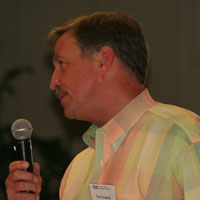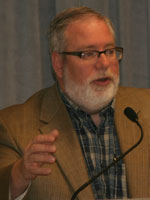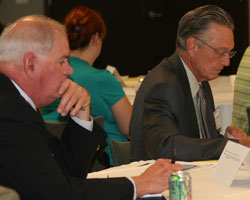June 29, 2009 – The State Bar of Wisconsin’s Board of Governors voiced support at its June 26 meeting for a proposal pending in Congress to fund Legal Services Corporation (LSC).

Gov. Paul Swanson, Oshkosh, weighs in at the board meeting.
LSC is the single largest funding source for civil legal assistance for the poor in the nation. Established by Congress in 1974, LSC operates as a private, nonprofit organization to promote equal access to justice and to provide high-quality legal assistance to low-income Americans. LSC awards grants to legal services providers, including Legal Action of Wisconsin and Wisconsin Judicare.
The governors voted unanimously to extend its public policy position to include efforts to remove restrictions currently imposed on LSC grantees. A number of restrictions on lawyers working for LSC grantees were imposed by Congress in the mid-1990s that limited the professional judgment of attorneys and restricted the remedies they could seek for clients. Under the newly adopted policy position, the State Bar supports “a legal aid system that does not interfere with poor persons’ full access to the courts or deny advocacy that is available to others in our society.”
Support for the governors’ actions came from the Legal Assistance Committee (LAC) as well as the Public Interest Law and Individual Rights and Responsibilities sections.
Prior to the governors’ meeting, the U.S. House of Representatives voted to authorize LSC funding at $440 million for the Fiscal Year 2010 that starts on Oct. 1. The LSC appropriation is a $50 million increase above the FY 2009 LSC funding level of $390 million, but below the inflation-adjusted $578 appropriated in FY 1995 and the inflation-adjusted $749 million in FY 1981.

William Domina, Milwaukee, Finance Committee chair presents FY 2010 annual budget for discussion.
Most of the FY 2010 LSC funding would be distributed to 137 independent nonprofit legal aid programs across the country. Legal Action of Wisconsin and Wisconsin Judicare received $4.6 million from the FY 2009 LSC appropriation and would qualify for a projected $5.2 million under the House bill.
State Bar President Diane Diel said that Legal Action of Wisconsin and Wisconsin Judicare, which also receive funds from the Wisconsin Trust Account Foundation, Inc. (WisTAF), handled at least 8,200 legal matters last year. She predicted the wave of unemployment and foreclosures will continue to add pressure.
p>“I welcome the additional funds appropriated by the House bill and I hope the Senate will promptly follow suit. Wisconsin has more than 450,000 people who qualify for free legal assistance and our LSC-funded programs face escalating requests for help that they are hard pressed to meet as families face mounting job, housing, medical care, and other challenges,” Diel said.
In other business, the governors took the following actions.
State Bar budget. The board approved the State Bar’s $11.8 million budget for FY 2010.
Management of Court Records. The board unanimously supported a petition to amend SCR Chapter 72.06(1), clarifying the authority of Wisconsin courts to manage their own files, including their expungement. Currently, circuit court judges are reluctant to exercise their inherent authority to expunge court files despite court precedent making clear that they may do so, petition proponents told the governors.

Governors Thomas L. Schober, Green Bay, (left) and James Duchemin, Eau Claire study materials at board meeting.
The change sought by the Criminal Law and Individual Rights and Responsibilities sections is aimed at assisting clients who have been unlawfully discriminated against because of an arrest or conviction record.
Fee for late dues payment. The board supported a State Bar Bylaw change to move the $25 late filing fee date from Sept. 30 to Aug. 31. Article I, section 3 (a) of the State Bar Bylaws allows for penalties to be assessed for delinquent payment.
The late fee is used to offset the more than $10,000 in dues money used to collect the last 800-900 payments, many of whom are the same members year to year. The purpose of the change is to remove the burden of the additional costs from timely paying members and hopefully deter late payments.
Payment of dues and assessments is due by July 1. The State Bar issues up to three billing statements with the final notice sent by certified mail. Failure to pay the dues by Oct. 31 automatically results in suspension.
Access to Justice Commission. The board approved President Diane Diel’s recommendation to appoint Howard Bichler, Bowler; Hannah Dugan, Milwaukee; and the Hon. Margaret Vergeront, Madison, to serve on the Access to Justice Commission.
The Wisconsin Supreme Court voted on May 13 to approve a new Supreme Court Rule directing the creation of a new Wisconsin Access to Justice Commission. The Access to Justice Commission will be charged with developing and encouraging means of expanding access to the civil justice system for unrepresented low-income Wisconsin residents. The State Bar had petitioned the court last summer for the commission as a key recommendation of its report documenting a serious lack of civil legal services and proposing solutions.
Siefert v. Alexander. The board approved a resolution thanking attorneys Michael B. Brennan and Beth Hanan, both of Milwaukee, for drafting and filing an amicus with the Seventh Circuit Court of Appeals in Siefert v. Alexander.
Milwaukee Judge John Siefert has challenged three provisions of the Wisconsin Code of Judicial Conduct as infringements of his First Amendment speech rights. Specifically, he contests SCR 60.06(2)(b)(1) prohibiting party membership of a judge or judicial candidate, SCR 60.06(2)(b)(4) forbidding a judge or judicial candidate from publicly endorsing a political party candidate or platform, and SCR 60.06(4) preventing a judge or judicial candidate from personally soliciting or accepting campaign contributions.
Other appointments/elections. The board approved the Nomination Committee's recommendation to appoint James M. Brennan, Milwaukee, to serve as FY 2010 board chair.
The board elected the following to serve on the FY 2010 Executive Committee: William Domina, Milwaukee; Margaret Hickey, Milwaukee; Marsha Mansfield, Madison; Kevin Palmersheim, Middleton; Mark Pennow, Green Bay; and Marla Stephens, Milwaukee.
The president, president-elect, past president, chair of the board, and one representative each from the Nonresident, Government, Young, and Senior Lawyers divisions also serve on the committee. All terms begin July 1.
The board approved the appointment of Tom Basting, Madison; Kristin M. Bergstrom, Milwaukee; Dean Dietrich, Wausau; and Patricia Knight, Milwaukee, to the Wisconsin Trust Account Foundation (WisTAF) board. The supreme court created WisTAF in 1986 to manage the state's Interest on Lawyers Trust Account program and provide financial support for the delivery of legal services to Wisconsin's low-income residents.
